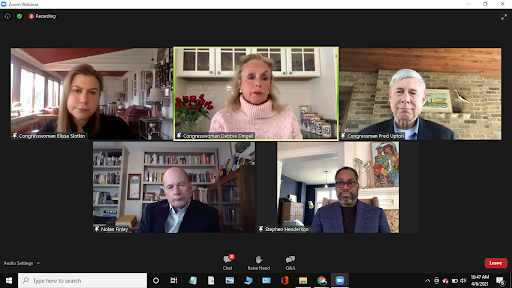Slotkin, Dingell and Upton talk problem solvers caucus

A screenshot from the “Defy the Divide: A Path to Civility” event.
Civility was the word of the day at the Center for Civic Engagement’s April 6 event “Defy the Divide: A Path to Civility.”
U.S. House Representatives from Michigan – Elissa Slotkin, Debbie Dingell and Fred Upton – spoke with journalists and Civility Project founders Noah Finley and Stephen Henderson about the widening divide in Congress. Slotkin and Dingell, who are Democrats, and Upton, a Republican, are members of the bipartisan Problem Solvers Caucus (PSC). The PSC aims to find common ground between Democrats and Republicans regarding key issues and has an equal number of members of either party.
“We have an absolute civility pledge that all of us take,” Upton said. “With divided government, the only way you are going to get things done is to work together, have trust with each other, have common sense and try to move the ball forward. That is what this caucus is dedicated to.”
While the PSC is dedicated to bridging the political gap, Henderson brought up the fact that each of the members are still members of political parties with their own partisan goals.
“I think when people look at something like a PSC the natural question is ‘How far can this really go?’” Henderson asked. “How much can you really accomplish, because at some point your own party is going to yank your chain.”
To Upton, voters care about more results than doctrinal purity.
“[Voters] want the job done,” he said. “They want you to listen. They want you to work with divided government.”
Slotkin agreed with Upton’s assessment of voter priorities.
“Of course there is pressure, you feel it every single day, but you just make sure people understand I do not vote because someone tells me to vote a certain way,” she said. “You read the bills, you actually learn about what you are voting on and you are accountable to the people who elected you — not to your national leadership.”
Finley took a particular curiosity in how the representatives handled pushback from their respective party leadership.
“At what point do [congressional leaders] jerk back and say ‘You have got to fall in line with the partisan caucuses’?” Finley asked.
Dingell, who serves on several House committees and is a Senior Whip, made it clear that party leaders have only so much sway over her decisions.
“I have a reputation for saying exactly what I think [Democratic House leadership] need to hear, not what they want to hear,” she said. “It does not mean my head is not decapitated at least once a week, but I am who I am. I say what I think and I think there needs to be more people that tell people what they think.”
As for the other chamber of congress, Dingell is not optimistic about what removing the Senate’s filibuster would do for reigniting civility.
“I have a lot of friends that are in the Senate — Republicans and Democrats — but people who are willing to sit at a table and talk with each other are leaving,” she said. “Roy Blunt [Senator from Missouri] is leaving the Senate because he talks about how toxic it has become.”
Dingell and Upton spoke about how working in the Congress has become so dysfunctional, with members of opposing parties calling to adjourn sessions and adding unnecessary votes to extend the working day.
In regards to how the members of the Problem Solvers Caucus can expand their mission beyond legislation, Upton says members need to “go on the road.” This means taking part in speaking events and getting the word out through the media.
“This is something the people are yearning for and they need to see us do it,” Upton said.
Slotkin believes that members of the caucus need to use their positions as elected officials and bring people with opposing political goals together.
“This, to me, was really brought home frankly after the murder of George Floyd,” she said. “I had different groups talking to me but they were not talking to each other. And because Zoom makes it a whole lot easier, we started bringing those communities together. I have actually done training on conflict resolution because there are so many disparate voices in my district.”
Despite the best efforts of the caucus, civility is still stretched thin across the political world.
“I am very worried about what is going to happen in the 2022 election,” Dingell said. “You need to really be aware of who you are electing in the 2022 election. If you want to see more unity, you want to see respect and civility and empathy for each other, then you need to demand that of the people you elect, no matter their party.”









